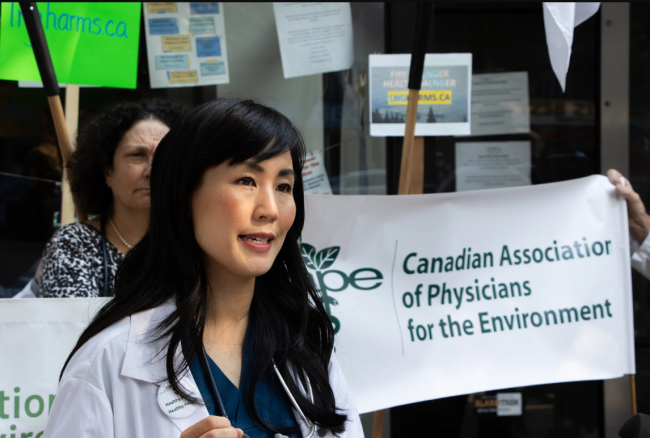Articles Menu

Aug. 24, 2023
Hundreds of doctors, nurses and other Canadian health-care professionals have issued a public health advisory on the health harms of expanding B.C.'s fracking and natural gas infrastructure amidst the climate crisis.
The advisory calls on the provincial government to halt new natural gas developments and conduct an assessment of the industry's impact on health, including the health impacts of climate change. It comes as thousands have been displaced across Canada during the country's worst wildfire season on record, which experts say has been fuelled by the warming climate.
The group is also asking for stronger regulations and independent water and air quality monitoring around the province's existing hydraulic fracturing, or "fracking," operations. These operations use thousands of chemicals, including many that have never been tested for health risks.
"This summer, doctors and nurses in every province and territory have been dealing with the fallout of the climate emergency, whether it's asthma exacerbations, heart attacks or stroke or PTSD or anxiety and depression," said Canadian Association of Physicians for the Environment president Dr. Melissa Lem, a Vancouver-area GP. "The fossil fuel industry, the LNG and fracking industries are pouring fuel on these fires."
Natural gas is largely methane, a hydrocarbon responsible for roughly a quarter of global heating. Natural gas production is a major source of methane emissions that leak into the atmosphere throughout the product's lifetime. Burning natural gas also generates CO2, exacerbating the fuel's impact on the crisis. These emissions are fuelling the surge of wildfires scorching Canada this summer, with a recent study noting they made Quebec's fires twice as likely.
Climate disasters are linked to a suite of health impacts, from increased rates of illnesses like asthma and heart disease from smoke to depression, anxiety and PTSD, said Lem. Natural gas specifically also poses a threat to people living near wells and production facilities and can harm the respiratory systems of people who use it to cook at home.
Despite these impacts, Canada is ramping up its natural gas production. In B.C. alone, the province is supporting the development of three proposed terminals to export liquified natural gas against significant pushback. The B.C. government did not respond to requests for comment by deadline.
The country is also being pressured by lobbying efforts and disinformation campaigns from natural gas utilities to continue to expand the use of natural gas in new buildings, despite evidence that electric heat and cooking are cheaper and more sustainable.
The health impacts of the gas and the climate disasters it fuels are already evident in hospitals and clinics across the country, said Lem and other medical professionals announcing the health advisory. From respiratory illnesses to cancers, they are seeing people suffer nearly daily.
Hundreds of doctors, nurses and other Canadian health-care professionals have issued a public health advisory on the health harms of expanding B.C.'s fracking and natural gas infrastructure as the climate crisis steams ahead - Twitter
"My training did not prepare me to deal with the crisis we are now facing," said Vancouver doctor Kelly Lau as she cited patients injured by the 2021 heat dome and floods and more recent wildfires. "I want my future to be spent preventing and managing chronic disease, not always responding to heatstroke, wildfire-induced respiratory disease and psychological stress."
[Top photo: Hundreds of doctors, nurses and health-care workers across Canada have issued a public health advisory about natural gas, said Canadian Association of Physicians for the Environment president Melissa Lem. Photo by Marc Fawcett-Atkinson/National Observer]